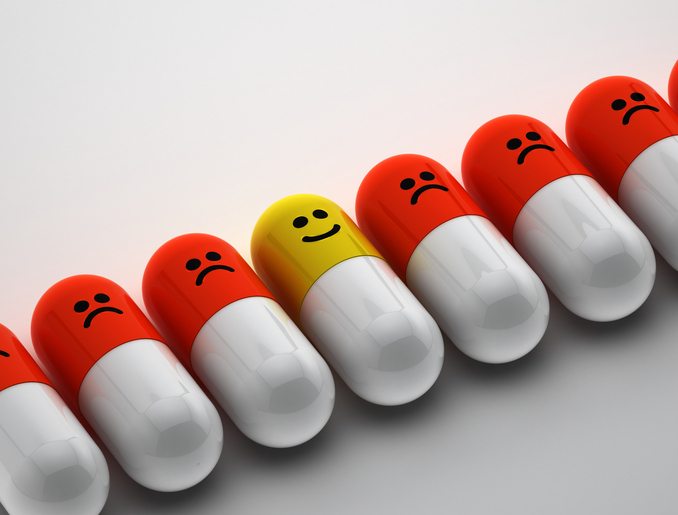For years it’s been believed depression stems from an imbalance of serotonin in the brain. Now, increasing evidence suggests another culprit might be at work – inflammation in the body. Anna Magee reports
When Brooke Shields was diagnosed with post-natal depression in 2005, she said she found it ‘comforting’ to know her low mood was ‘directly tied to a biochemical shift’; a chemical imbalance in her brain. It’s a popular and well-known theory: if you’re depressed, you probably have low levels of serotonin, the neurotransmitter in the brain responsible for our happiness, an imbalance that antidepressant medication known as selective serotonin reuptake inhibitors or SSRIs can fix.
Prozac, the world’s most famous antidepressant, turns 30 next year
Indeed, Prozac, the world’s most famous SSRI, turns 30 next year and NHS Digital data reports that antidepressant prescriptions increased by 3.9 million – their largest rise ever – between 2014 and 2015 and more than doubled in the last decade reaching a staggering 61 million last year. But for a growing number of doctors la new thereof depression is gaining ground. That it’s not so much about a chemical imbalance in our brains but about inflammation in the body that can manifest as mood changes. It may be welcome news to the approximately half of depressed patients who don’t respond to first line treatment with SSRIs.

Chemical imbalance? Or myth?
Dr Kelly Brogan, the author of A Mind of Your Own (from Amazon) is one such doctor. Her book is an illuminating – and incredibly well-referenced – look at the theories of the causes of depression and the scientific evidence that lay behind them. ’In six decades, not a single study has proven that depression is caused by a chemical imbalance in the brain,’ explains Dr Brogan, a qualified psychiatrist who studied cognitive neuroscience at the Massachusetts Institute of Technology and now practices in New York. Depression is not a genetic disease, but an epigenetic syndrome, she claims. In other words, it is affected by the way we live our lives and what happens to us and the environments we are exposed to in early childhood and adolescence. In 2003, a study published in Science suggested that those with genetic variation in their serotonin transporter were three times more likely to be depressed. But Dr Brogan points out that six years later this idea was wiped out by a meta-analysis of 14,000 patients published in the Journal of the American Medical Association that denied such an association. In April last year, Dr David Healy, professor of psychiatry at Bangor University published a paper in the British Medical Journal called Serotonin and Depression: the marketing of a myth. ‘The lowered serotonin theory [of depression] took root in the public domain rather than in psychopharmacology…a piece of biobabble.’ Indeed, in his book Bad Pharma (£12.99 4th Estate) medical doctor and science writer Ben Goldacre says, ‘The ‘serotonin hypothesis’ for depression, as it is known, was always shaky and the evidence now is hugely contradictory. But in popular culture the depression-serotonin theory is proven and absolute, because it has been marketed so effectively.’
Depression and inflammation
On the evidence for the serotonin theory of depression, Dr Brogan claims, ‘There has never been a human study that successfully links low serotonin levels and depression.’ She is one of a growing number of psychiatrists who instead believe that depression can result when our immune systems work in overdrive causing inflammation that may manifest in the brain. ‘Depression is often an inflammatory condition, a manifestation of irregularities in the body that can start far away from the brain and are not associated with the simplistic model of so-called ‘chemical imbalances,’ says Dr Brogan.
when we’re sick or under stress, the body releases chemicals that are involved in inflammation that can directly affect our moods
The new blood test that could change everything
Brogan is not alone in her belief that depression can be caused by an errant immune system causing inflammation in the body which can alter mood; the argument being that when we’re sick or under stress, the body releases chemicals that are involved in inflammation that can directly affect our moods. In fact, studies have shown that high levels of inflammation in the body are associated with low or no response to SSRIs. In July this year, researchers from King’s College London published a study in The International Journal of Neuropsychopharmacology in which they gave depressed patients a blood test that focused on two biomarkers measuring inflammation in the body. Patients with high levels of inflammatory markers were the ones that didn’t respond to SSRIs. Professor Carmine Pariente, from the Institute of Psychiatry, Psychology & Neuroscience (IoPPN) at King’s College London and senior author of the study, said: ‘The identification of biomarkers that predict treatment response is crucial in reducing the social and economic burden of depression, and improving quality of life of patients,’ he said.
‘This study provides a clinically-suitable approach for personalising antidepressant therapy – patients who have blood inflammation above a certain threshold could be directed toward earlier access to more assertive antidepressant strategies, including the addition of other antidepressants or anti-inflammatory drugs.’ Though more research, testing and development of the blood test is needed, the researchers said it paves the way for more ‘personalised psychiatry’ where treatment is guided by such blood tests, rather than the current one-size-fits-all approach.

How our immune systems can make us depressed
‘The substances we produce in response to an infection such as a virus are called cytokines and they signal the immune system to activate,’ says Dr Valeria Mondelli, senior clinical lecturer in psychological medicine at King’s College London. They can also activate in response to stress at lower levels too. This can lead to inflammation that can decrease the number of neurons in our brains and affect the way they network with eachother, leading to depression, she explains. ‘We’ve seen repeatedly that people with depression have higher levels of inflammation in their brains and this we think could be a new theory of depression in competition to the chemical imbalance theory’. Dr Mondelli last year published a meta analysis which found that people who had experienced traumatic effects in childhood had higher levels of brain inflammation in adulthood. ‘In our study, subjects who experienced childhood stress had increased inflammation in their brains in adulthood,’ she explains. ‘We found that having had severe stress during childhood predisposes you to mental health problems by increasing the levels of inflammation’.
‘inflammation can decrease the number of neurons in our brains and affect the way they network with eachother, leading to depression
But it’s not just inflammation from stress that can lead to increased levels of depression, the immune system’s response to physical disease may also play a part. Fascinatingly, at the Glasgow Royal Infirmary doctors noticed that when patients with rheumatoid arthritis (RA) – caused when the immune system attacks the joints – were given precise anti-inflammatory drugs to calm down the immune system, their mood improved. And it wasn’t just about feeling happier because their pain had improved. ‘We scanned the brains of people with RA, we then gave them a very specific immune targeted therapy and then we imaged them afterwards,’ says professor Iain McInnes, a consultant rheumatologist. ‘The brain pathways involved in mediating depression were favourably changed in people who were given immune interventions.’ Though more trials are needed before such therapies become clinically available to the vast majority of us, they’re a promising first step.
 Want to beat depression? Reduce inflammation
Want to beat depression? Reduce inflammation
Dr Kelly Brogan, author of A Mind of Your Own points to lifestyle changes with a natural anti-inflammatory effect that can help improve your mood
Exercise ‘Depression can result from chronic ongoing stress and exercise acts like a biological insurance plan against the bodily effects of stress,’ says Dr Brogan. 20 minutes three times a week or more of anything that gets you sweaty is all that’s needed.
Diet Eliminate processed foods, especially sugar and refined carbohydrates which may increase inflammation in the body. Eat plenty of natural foods including fruits and vegetables, pastured animal products and eggs and wild fish.
Meditate ‘Volumes of data show meditation stimulates the expression of genes that are powerfully anti-inflammatory,’ says Dr Brogan. Just ten minutes a day of mindfulness, deep breathing or gratitude journaling can help mood. Try mindfulness meditations with Professor Mark Williams (Ruby Wax’s meditation teacher) from the app store
Like this article? Sign up to our newsletter to get more articles like this delivered straight to your inbox.




 Want to beat depression? Reduce inflammation
Want to beat depression? Reduce inflammation
















































